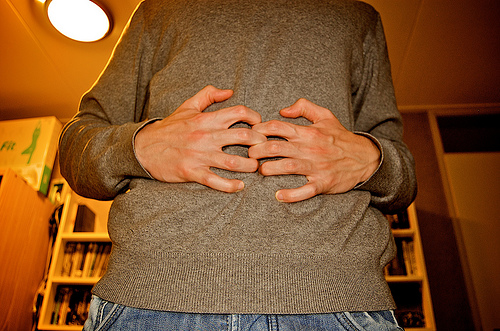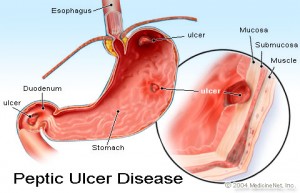Dear Grettie-
I have an ulcer. What can I do naturally to help it heal and what can I do in the future to avoid its return?
-Andy
I am sorry to hear that you have been suffering with an ulcer as I hear they can be extremely painful! Unfortunately you are not alone as it is estimated that 1 in 10 people will succumb to this fate during their lifetime [1]. As I mentioned, ulcers can be extremely painful since they are basically open wounds in your esophagus, stomach, or intestine.
My research indicates that there are definitely actions you can take to help heal your ulcer and prevent them in the future. I do want to mention that it is very important you be diagnosed by a doctor and consult your doctor while designing your treatment plan. The advice below should not be considered medical advice as I am most definitely not a doctor.
Ulcers can also be very serious business. Ulcers resulting in bloody vomit (especially if it resembles coffee grounds) or stool (bloody or black) are cause for immediate medical attention.
POSSIBLE ULCER CAUSES
The general belief used to be that ulcers were caused by stress and eating spicy foods. While those behaviors can definitely exacerbate an ulcer, it is now widely believed that the main culprit in the formation of ulcers is a bacterial infection from Helicobacter pylori (otherwise known as H. pylori). H. pylori is common and affects “1 in 5 people under the age of 30 and about half of the population older than 60 [2].” The theory is that somehow (possible causes listed below), the mucosal lining of the stomach and small intestine becomes compromised and at that point the H. pylori is able to invade.
The second most common cause of ulcers is believed to be the long-term use of anti-inflammatory drugs (Advil, Aleve, Motrin) [3].
Contributing factors to the deterioration of the mucosal lining can be:
- Smoking – Nicotine will increase the amount of acid in the stomach
- Food Allergies – There is some research indicating that food allergies (which often result in a high amount of irritation) can be responsible for ulcer formation [4]
- Alcohol consumption – irritates the lining of the stomach
- Coffee, tea, and carbonated beverage consumption – also irritates the stomach and increases stomach acid
- Vitamin K deficiency – Vitamin K is a key nutrient connected with blood clotting
- Radiation
- Burns
.
STEPS ONE CAN TAKE TO PREVENT ULCERS
According to the University of Maryland Medical Center, you should eliminate the contributing factors listed above and follow these nutritional tips:
- Eat foods containing flavonoids – like apples, celery, cranberries (including cranberry juice), onions, garlic, and tea may inhibit the growth of H. pylori.
- Eat antioxidant foods – including fruits (such as blueberries, cherries, and tomatoes), and vegetables (such as squash and bell peppers).
- Eat foods high in B-vitamins and calcium – such as almonds, beans, whole grains (if no allergy), dark leafy greens (such as spinach and kale), and sea vegetables.
- Avoid refined foods – such as white breads, pastas, and sugar.
- Eat fewer red meats (YEAH TO THE VEGANS!) and eat tofu (soy, if no allergy) or beans for protein.
- Use healthy oils – such as olive oil or vegetable oil.
- Reduce or eliminate trans-fatty acids – found in commercially baked goods such as cookies, crackers, cakes, French fries, onion rings, donuts, processed foods, and margarine.
- Drink 6 – 8 glasses of filtered water daily.
- Exercise at least 30 minutes daily, 5 days a week.
.
NATURAL REMEDIES FOR ULCERS
If you are already suffering from an ulcer make sure you follow the advice above. In addition, several references agree that the following can be quite helpful in the healing process:
- Fresh cabbage juice – up to 1 liter per day (divided throughout the day). Dr. Garnett Cheney from Stanford University’s School of Medicine performed several studies resulting in the documentation that “the majority of the patients experienced complete healing in as little as seven days [5].”
- Bananas – Eating bananas 3 times a day with almond milk does a fantastic job of neutralizing stomach acid and coating the stomach lining.
- Lime – aids digestion
- Mastic gum – is useful for its antimicrobial benefits and has been used in the Mediterranean for Middle East for thousands of years. Research has shown mastic gum to be effective against 7 strains of H. pylori bacteria [6]. Take 1,000 to 2,000 mg daily in divided dosages.
- Apple cider vinegar – Naturally very high in vitamin K, apple cider vinegar helps blood clot and is also a natural antiseptic. Add a teaspoon of apple cider vinegar to a glass of water and drink it as maintenance. When in an acute episode, add up to a few tablespoons of apple cider vinegar to water and drink in order to help neutralize stomach acid. Drink until you feel the pain subside.
- Probiotic supplement (click here to see a past Ask Grettie post about probiotics).
- Vitamin C, 500 – 1,000 mg 1 – 3 times daily – Vitamin C may be helpful in treating bleeding stomach ulcers caused by aspirin use.
- Eat alkalizing foods – click here for a Veggie Grettie post about the importance of an alkaline diet.
- DGL-licorice standardized extract – 250 to 500 mg 3 times daily, chewed either 1 hour before or 2 hours after meals — may help protect against stomach damage from NSAIDs. Glycyrrhizin is a chemical found in licorice that causes side effects and drug interactions. DGL is deglycyrrhizinated licorice, or licorice with the glycyrrhizin removed.
- Cranberry – 400 mg twice daily. Some preliminary research suggests cranberry may inhibit H. pylori growth in the stomach.
- Peppermint standardized, enteric coated tablet – 1 tablet 2 – 3 times daily — may help relieve symptoms of peptic ulcer. Each tablet contains 0.2 ml peppermint oil. Be sure to use the enteric coated form to avoid heartburn.
.
**Do you have a questions for Grettie? She is here to answer any of your health and nutrition related questions! Email her at askgrettie@chicvegan.com .**
—–
 Gretchen Tseng is a Nutrition Specialist with Certification in Plant-Based Nutrition through Cornell University. At a young age she experienced a series of illnesses which propelled her to seek nutrition based solutions. Gretchen is absolutely passionate about sharing the health benefits of a plant-based lifestyle and can be found doing so through her website Veggie Grettie at www.veggiegrettie.com . Gretchen lives in Southern California with her husband, two children, and 4 legged best bud. She dreams of living on a farm someday surrounded by animals and the most amazing organic garden she can imagine.
Gretchen Tseng is a Nutrition Specialist with Certification in Plant-Based Nutrition through Cornell University. At a young age she experienced a series of illnesses which propelled her to seek nutrition based solutions. Gretchen is absolutely passionate about sharing the health benefits of a plant-based lifestyle and can be found doing so through her website Veggie Grettie at www.veggiegrettie.com . Gretchen lives in Southern California with her husband, two children, and 4 legged best bud. She dreams of living on a farm someday surrounded by animals and the most amazing organic garden she can imagine.


Hello!
Back in 1998, I developed an ulcer resulting from the stress of being hit by a car, and the stress of losing my health, business, etc. I lost 30 lbs. This was so painful!!
My ulcer is now back (my father passed in January, and I’ve been in a legal battle with Medicare to get them to continue covering my spinal meds, drs visits, etc.). Lots of stress. My doctors do not believe MY particular ulcers are the result of bacteria, although many certainly are.
The GOOD news is, a nutritionist friend I’d mine recommended Aloe Vera Juice for the ulcer and wow! …I can’t believe how wonderfully aloe reduces the burning feeling in my stomach!
: )
I am not able to eat any citrus, including lime. And vinegar tears up my stomach, but probiotics help tremendously. I’ve been taking Primodofilous since 2001. That contains every strain of probiotic the system needs (for me, bifido bifidus was a must, according to another nutritionist who took a DNA hair sample test). This is found in the refrigerated area of most reputable health shops.
Just thought I’d share my insights…hopefully someone will find relief with the aloe juice (1 ounce daily…talk to doctor first, of course!).
Thank you for this wonderful blog! 🙂
Hi. I have a twin sister and we both have had stomach ulcer issues. We are 17 now.
(I was 10 years old when I first had issues in my lower esophageal area, but the doctors I had seen claimed that I was too young to have them. I think this was caused from eating Flaming Hot Cheetos EVERY SINGLE DAY. So, I believe that I, indeed, had ulcers at 10 years old).
My sister Cierra, on the other hand, started having mild issues with her stomach when she was 14. She had pain similar to what I was experiencing, but mine does not bother me now because I am staying away from spicy and fried/greasy foods.
When we were 15, we became vegetarians because meat was not setting right with us anymore. Around November 2014, my sister’s stomach ulcers flared up really bad. The doctors never told us what this was from so we still have questions and concerns. Each time her ulcers get irritated, we go to the emergency room and eventually make an appointment with her Digestive Healthcare doctor. All they give her is acid reducers and pain medicine. We are DESPERATE for answers and real solutions to help heal and prevent the ulcers from coming back.
Can they truly go away? Does natural remedies work 100% as people claim? She keeps having to miss school because the pain is so severe and her doctor’s advice is ineffecive. I am calling out to someone who may have similar ulcer-related problems.
Sorry to hear about your issues with stomach ulcers. It sounds like you should talk to a naturopath or holistic doctor to see what natural remedies would work best for you and your sister.